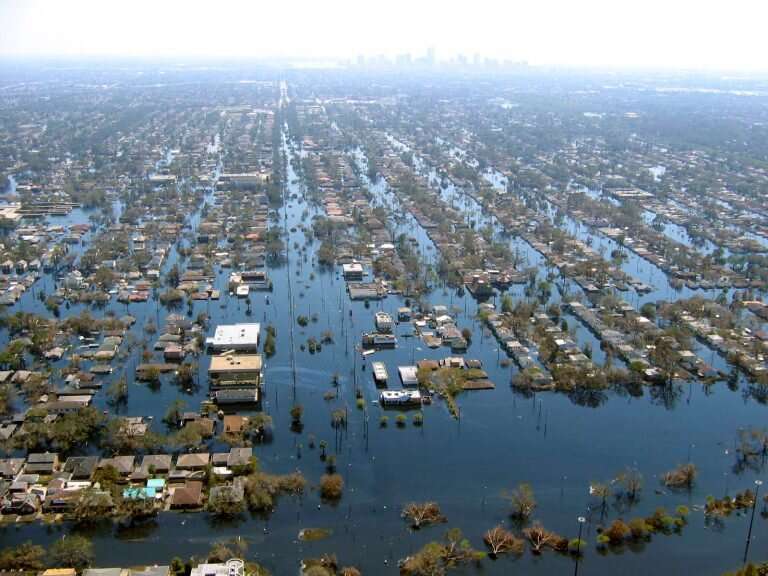This article has been reviewed according to Science X's editorial process and policies. Editors have highlighted the following attributes while ensuring the content's credibility:
fact-checked
trusted source
proofread
Should we stop using the term 'natural disaster?'

When we think of the term "natural disaster," we think of the horrific events like Hurricane Katrina, the fires and floods ripping through California, and the 2010 earthquake in Haiti. Each of these events began with a natural phenomenon and ended up costing substantial human life and billions of dollars—thus becoming a disaster.
The term "natural disaster" has long been used by scientists, media, and politicians to discuss these events. However, confounding factors such as climate change and exacerbated social inequality have sparked a reconsideration of the term. It's no secret that natural disasters have been worsening in recent years, taking more lives, and changing the shape of our planet at an exponential rate. According to the World Meteorology Organization, the number of disasters has increased by a factor of five over the past 50 years. There has been a sense of shock and abnormality in reaction to many of the hurricanes, floods, and fires plaguing the world recently.
Have these disasters shifted far enough to no longer be considered "natural?" And does it really matter what we call them? Investigating this question, I spoke with John. C Mutter—a faculty member of the Columbia Climate School's Earth Institute—and anthropologist J.C Salyer at Barnard college.
Why does the terminology we use to describe these disastrous weather events matter? While Salyer's work doesn't have much to do with climate science, his course, "Climate Change, Migration, and Human Rights" emphasizes that the words that we use to describe events that impact human rights and well-being can greatly impact the affected people.
Salyer says that the way we title something, specifically an event, changes the blame, the interpretation, and scale of a situation. He gave an example using the term "climate refugee." He says that using the word refugee to describe people displaced by climate change indicates that their situation is somehow reversible, that their displacement is temporary. However, that is not the case. Sea level rise is not reversible, and increased temperatures are not going down—at least not in our lifetimes. But the term "climate refugee" widely used by organizations like the United Nations implies to the world that these conditions are not permanent, and this changes the way that these displaced people are treated.
Is this the same case for the term "natural disaster," and if so what are the implications of this term, and are they provocative enough to warrant a change in terminology?
Both Mutter and Salyer agree that natural disasters can have both a natural component—"You can't have a cyclone disaster without the cyclone component, and that is natural," says Mutter—and a human component. Human actions may both help to create the disaster and make its impacts worse—for example, by encouraging real estate along hurricane-prone coastlines.
Mutter says if there are people who do not understand that human agency is involved in the creation of a natural disaster, then maybe changing the term to something like "disaster" would be understandable. However, he does not think that this is the case. In the view of both Mutter and Salyer, it is widely accepted in their world that natural disasters haven't really been natural for a long time. The scientists and people making decisions around these events generally understand the multitude of "unnatural" causes that turn these events into disasters. However, these unnatural influences may not be understood by the majority of people who consume the media coverage of these events and who vote decisionmakers into power.
Coming up with a term that communicates this human element of disasters is complicated—so far, there's no perfect alternative to "natural disaster." However, as climate change worsens the intensity of these phenomena, it's important for everyone to know these events are linked to climate change and socioeconomic inequality.
So now the questions are: Does the rest of the world interpret "natural disaster" the same, and would changing the name be worthwhile? Does continuing to call these events "natural" decrease the sense of urgency involved in climate mitigation and human rights?
According to Salyer, the term "natural disaster" refers to a single humanitarian crisis or event, like Hurricane Katrina, and it can elicit a charity response. We treat each disaster as a single event to provide some help for, but we don't have a real obligation to create any change. We are ignoring a much larger underlying problem.
So should we stop using the term "natural disaster?" After speaking to professors Mutter and Salyer, the only really clear answer I got was that the term changes implication depending on what sphere it is being used in. In Mutter's world, a world of climate science and education—including, perhaps, the people who read State of the Planet—a change in terminology is rather redundant. In his upcoming book on natural disasters and social inequality, he gives a disclaimer at the beginning of the book that he will be referring to these events as natural disasters. It looks like the term is not on its way out, but has become controversial enough to warrant a disclaimer.
Steering away from the microcosm of social awareness and climate education and into the much larger world that gets most of their climate change news and education from sources like broadcast news, a change in terminology has the potential to change the way that we react to these increasing disasters.
What term would be capable of eliciting real change and action? That I do not know.
Provided by Earth Institute at Columbia University
This story is republished courtesy of Earth Institute, Columbia University http://blogs.ei.columbia.edu.




















